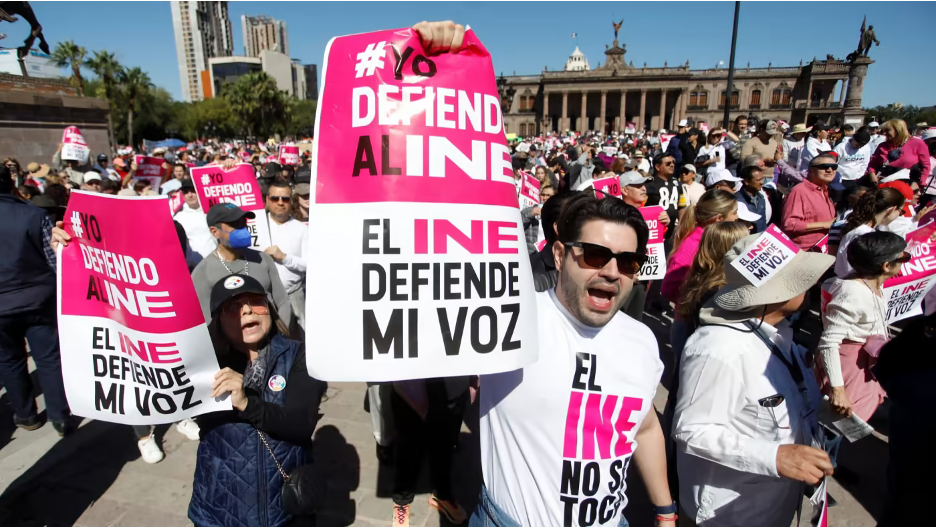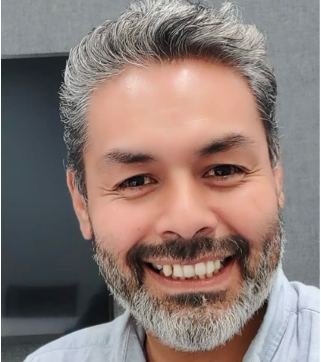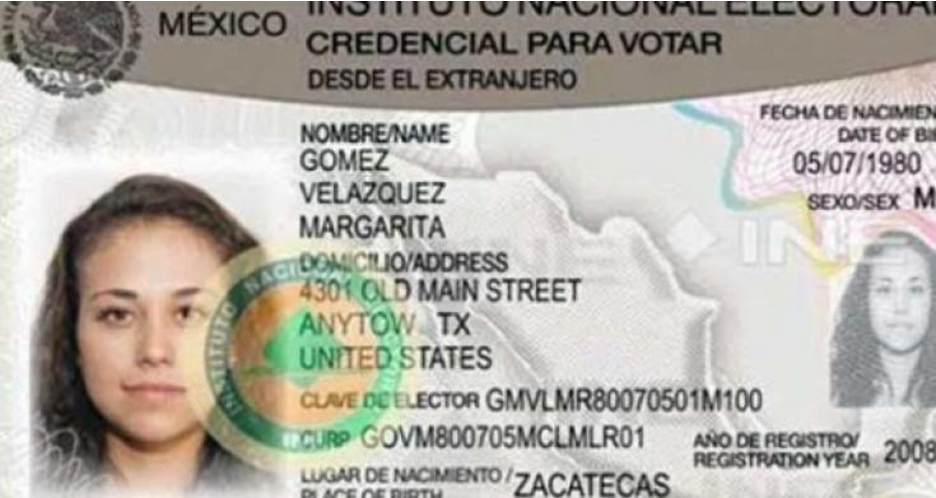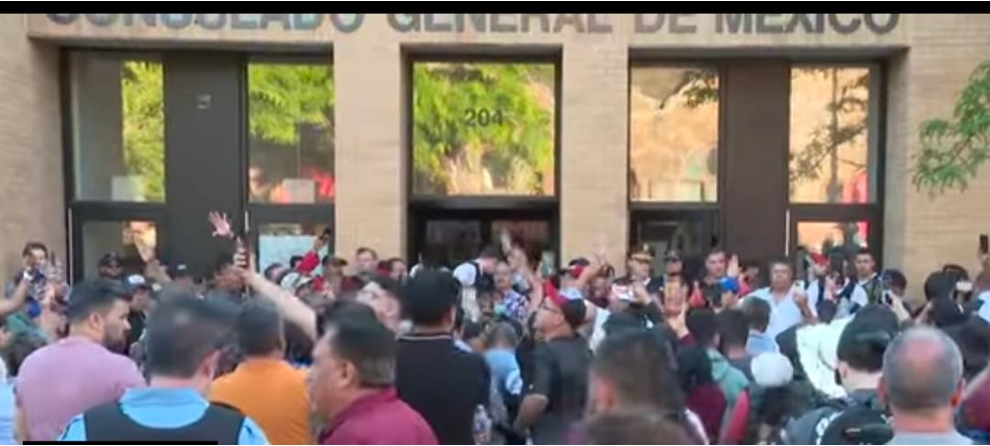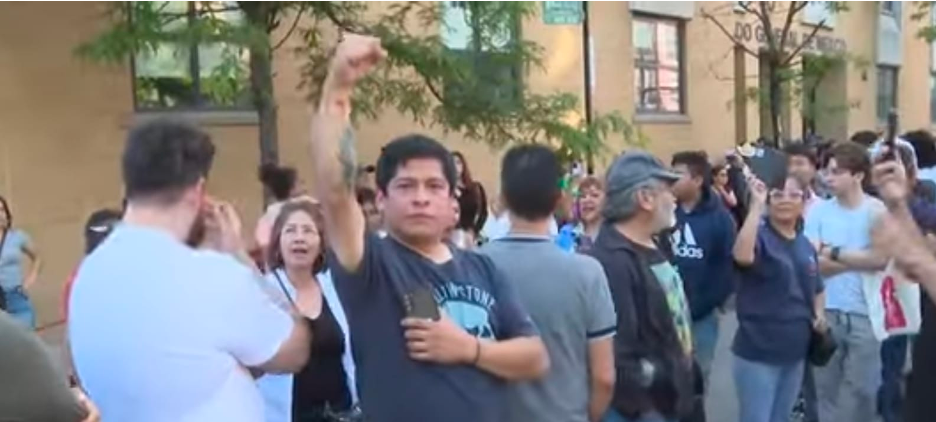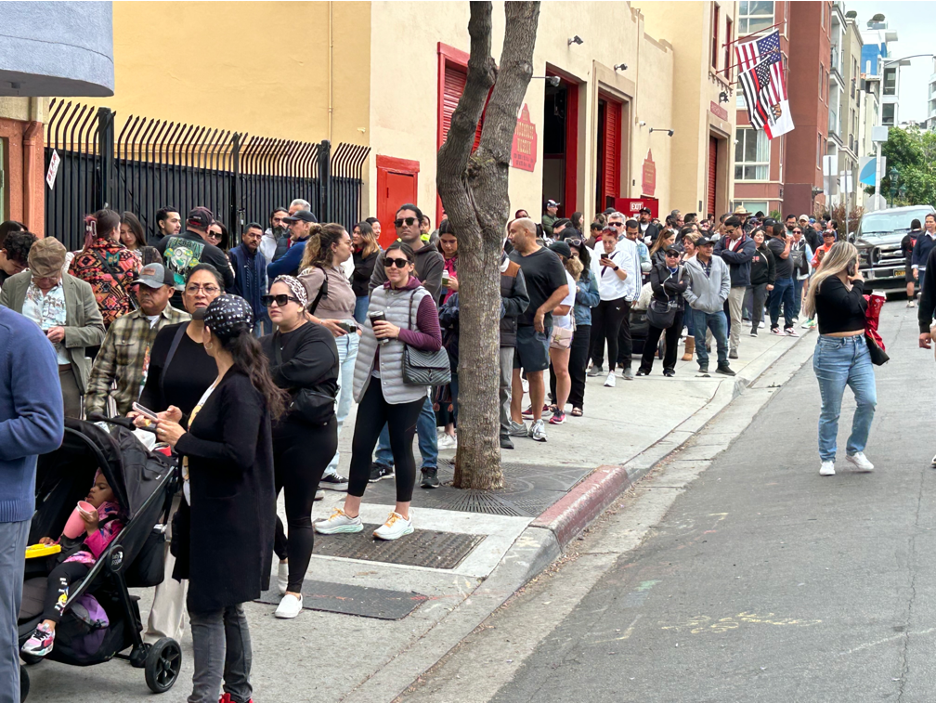|
|
The weekly newsletter of the Mexico Solidarity Project |
|
Every issue archived online at mexicosolidarityproject.org |
|
July 10, 2024 |
|
|
|
A Democratic election despite the INE |
|
Meizhu Lui, for the editorial team |
|
|
Right-wing opposition rally, February 2023: “I defend the INE; the INE defends my voice.” Photo: Reuters |
|
On February 26, 2023, thousands of people wearing pink, the color of the National Electoral Institute (INE) building, swarmed into the zocalo, Mexico City’s central square. They came to protest proposed reforms to the electoral apparatus by the AMLO government. The anti-AMLO crowd shouted, “El INE no se toca! Mi vota no se toca!” (“Hands off the INE! Hands off my vote!”)
The PRI’s Enrique Madrid Cordero called on people to join the protest, stating that “without democracy, you can’t solve anything.” Given that the PRI solved nothing for the people during its last 30 years of neo-liberal rule — the rich got richer and greedier and the poor poorer and angrier — his statement indicted his own party’s record on democratic rule.
Why the fuss? AMLO had proposed a law that would cut the INE’s enormous budget and the workforce that’s responsible for managing Mexican elections. The opposition grasped the issue of democratic elections like a drowning man grasping seaweed as its best hope of defeating Morena on June 2.
The reform measure didn’t pass. The June 2 election was managed by the INE without any changes, including to its bloated budget. The government did keep its “hands off the INE.”
But did that guarantee “hands off my vote?” In today’s interview, Chicago activist Manuel Castro describes the scene at the Chicago Mexican consulate, the June 2 presidential polling place. Hundreds of eligible voters stood in line for hours, but at the end of the day, many never set foot in a voting booth!
Yet democracy ruled. In spite of the almost comical ineptitude of the INE, no one has denied the overwhelming electoral victory of Claudia Sheinbaum and the 4th transformation.
|
|
For a deeper dive into current news and analysis in English, check out our media website. And definitely see the new English podcast ¡Soberanía! (Sovereignty) with José Luis Granados Ceja and Kurt Hackbarth. They entertain, while dismantling the lies and distortions about Mexico fed to us by the mainstream media. |
|
Don’t miss an issue! Sign up for a free Mexico Solidarity Bulletin subscription. |
|
|
What a Mexican Election Day in Chicago! |
|
Born in Mexico City, Manuel Castro is the son of a Bracero Program migrant family. They lived and worked in California until he was 5, where Manuel experienced firsthand the difficult conditions Mexican migrants face in the US. It has shaped his life of political and community involvement. Back in the US since 2000, he’s currently studying political science and public administration, is a community organizer, supporter of Morena, and promoter of the human and political rights of Mexicans in the US and Mexico. |
|
|
How easy is it for Mexican citizens living abroad to register and vote in Mexican elections?
Registering to vote is like running in a circle while juggling three balls. The first hassle is you must go to a consulate in person and start the paperwork for getting a voter ID. Immigrants don’t have a lot of time — often they work two jobs, or three. After work, they want a bit of time with their family. And what if you don’t get off work before the consulate closes?
And you can’t just show up. You have to make an appointment, and the consulate doesn’t make voter IDs a priority. You have to have all your documents with you, and that’s not easy. Not everyone from Mexico’s rural areas even has birth certificates. The consulate can send you home with nothing. |
|
|
Sample voter ID with US address. Credit: Cynjen Romero |
|
After the consulate sends your information to the National Electoral Institute, or INE, you wait four to six weeks for a letter with a number so you can go online and fill out another questionnaire confirming your identity. Some applicants don’t have computers or know how to go online. |
|
Finally, after registration, you must tell the INE that you plan to vote. Voting lists are destroyed after each election, so they don’t know who voted before. Why? To guard against fraud? It’s another hoop to jump through. People often forget to renew their intention to vote; they can still vote, but it takes more time.
Who runs Mexican elections? Local officials, as in the US?
No, the INE is responsible for making sure the elections are free, fair and accessible to all eligible voters in Mexico and abroad. It’s an independent body, appointed by Congress, and members serve for seven years. Several were appointed by the PRI government before Morena won in 2018.
Their budget is incredible! For 2024, their budget was 22,000,000,000 pesos, or over a billion dollars. For Mexican citizens who live and vote in the US, they were allotted 1,000,000 pesos, or about $55,000, for each of the twenty consulates. It’s the world’s most expensive election agency, so elections should run smoothly. You’d think.
For the June 2, 2024 election, how did the INE prepare people to participate?
In January, I said to the INE, “We need flyers to tell people about the voting process.” They said, “We don’t have a budget for flyers.” In Chicago, we have an active Morena committee, so we dug up our own money for flyers. But what about farmworkers living in rural areas? Did they get information? The INE did nothing.
We have three ways to vote: by mail, online, or in person at the consulate. We encouraged people to vote in person because election day should be like a holiday. We wanted people to interact with each other after voting — go to the park, eat together, celebrate.
Describe the scene in Chicago at the consulate.
Voters started arriving at 4:00 am; I think some stayed overnight. When I arrived at 5:00, 200 people were standing in line, and by 9:00 over 1000 people. They were happy, in a good mood. |
|
|
Chicago voters. Photo: Manuel Castro |
|
But the INE only sent two people to handle everything; consulate staff weren’t working the polls. The guy from the INE didn’t know Chicago, didn’t realize his hotel was an hour away from the consulate, so he came late — at 10:00. No one told the Chicago city authorities that a vote was happening, so when the crowd got huge and started blocking the street, the police came. But the INE official didn’t speak English! I ended up translating, and luckily, the Chicago police were cool.
Inside the consulate, nine people could vote at a time — but then a computer or a barcode wouldn’t work, elders were unfamiliar with computerized voting machines — voting took 9 to 15 minutes for each person. The line moved slowly. By 2:00, people were getting angry. There were shouts of “F…king INE!” and “Fraud!” At 6:00, the INE officials came out and said the polls were closed. They didn’t allow the people still standing in line to vote! Some had waited all day. |
|
|
Chicago voters. Photo: Manuel Castro |
|
But someone started to sing the national anthem, followed by “Cielito Lindo.” Someone shouted out Claudia’s name. The voting area is supposed to be non-partisan, but people started cheering for Claudia. Someone brought a beatbox — and it turned into a festival. So the day ended with people happy again, knowing that Morena would win.
After June 2, a number of you went to Mexico City and filed a human rights complaint against the INE. Why human rights?
Electoral rights are human rights. Many who showed up to vote were not allowed to do so. People were put in danger. The INE knew people would congregate but provided no crowd control measures — no signs, no red cones, no people giving instructions, no moving the elderly or those in wheelchairs to the front. |
|
The INE had no consideration for people’s health. It was hot! They provided no water or food, no bathrooms; we had to go to a nearby restaurant. The owner said if people bought anything, like a bottle of water, they could use the restrooms. Fine for 100 people in a day, but 1000? By the day’s end, his toilet was backed up, and he was mad! |
|
|
San Diego voters. Photo: Martin Eder |
|
Not every city was as lucky as we were with the police. In Phoenix, Houston and New York, when the crowd flooded into the street, the police said, “Go home or we’ll arrest you!” They formed a blue line like for a riot; someone could have gotten hurt. The complete lack of regard for the people was a violation of their human rights.
What can the government do to avoid these problems next time?
AMLO’s proposed constitutional reforms to the electoral system won’t help Mexicans living abroad. We need our own chapter. It should be easier to register and vote in person at more places than consulates, for example, in Mexicano neighborhoods. We have many ideas we’ll take to the Congress.
We’re an important constituency. In each of the 20 cities, between three and ten thousand people showed up to vote. In spite of it all, 200,000 Mexicanos in the US voted by mail, online or in person. But we are millions. Next election, we’ll be many more!
Mexicans are interested in Mexican politics, including the US-Mexico relationship. They’ll want to vote in the US election in November. We have a lot at stake with all the current threats against us in the air. Mexicans voted for the progressive agenda in Mexico, and I think they’ll vote the same way in the US election. We’re ready to flex our political muscle! |
|
|
|
|
Claudia — from CDMX to the Entire Country |
|
Dana Corres Olguín is a communications specialist at the Autonomous University of Hidalgo. Recently, she coordinated communication strategies for Greenpeace Mexico. As a consultant on feminism, public health and other social issues, she co-authored methods for evaluating projects designed for public spaces, which have been used by SEDATU (Secretariat of Agrarian, Land, and Urban Development). |
|
|
Claudia Sheinbaum has never stopped working, never stopped engaging in political struggle to better the lives of Mexicans. She became a political activist in the 1980s as a student leader at the National Autonomous University in Mexico City (CDMX). Later, even as a doctoral student at Berkeley, she demonstrated against Mexico’s president, Salinas del Gortari. In 2006, she campaigned with AMLO as his spokesperson and could be seen at his side during protests.
In 2000, Andrés Manuel López Obrador (AMLO) was governor of CDMX, and thanks to the recommendation of someone close to him, he appointed her secretary of the environment. During AMLO’s and Claudia’s tenure from 2000-2005, Mexico City saw the opening of the Metrobús, Mexico City’s rapid transit system. (CDMX has the second largest metropolis in the hemisphere, and its left government had been strengthening the transportation network since 1997.) Her administration implemented air quality measurements in a city suffering from persistent pollution in high particulate matter and ozone, especially between the months of February and June.
In 2014, activists from many social movements founded Morena, and, not surprisingly, Sheinbaum was also a founder.
But Claudia became her own political figure in 2015 when she was elected mayor of Tlalpan, a borough of CDMX. A few years later, in 2021, CDMX itself elected her as their first woman head of government. As a scientist, she had a vision of a much better quality of life for the capital's residents, and she now worked to implement it. Her work made CDMX a safer city — she employed thousands more police and corrupt, repressive forces largely disappeared.
Claudia improved the city’s transportation system — the 40-year-old line 1 of the Metrobús was mostly renovated, and the entire fleet of 30-year-old trolleybuses was entirely renovated. For the first time, all CDMX transportation was united into a single system, with new public transportation established in previously neglected places. Although more always remains to be done, her accomplishments in transportation stand as an amazing tribute to her hard work and her commitment to the people.
Claudia Sheinbaum will soon continue that tireless work in Mexico’s highest office, the presidency. The symbolism of a female president offers millions of women and girls the possibility of becoming leaders and decision-makers in their country. She has provided a space for women in politics, a space once only for men. |
|
|
|
|
Recent news reports and commentaries, from progressive and mainstream media, |
|
Tony Wood, Mexico in Flux: Birth of a New Party System New Left Review. The Western Left still remains perplexed or ill-informed about (for reasons alluded to in this piece) about AMLO, the 4th Transformation and the politics of the world’s 11th largest economy, or worse - patronizing - but after Claudia Sheinbaum’s electoral victory there are some attempts, like this, to grapple with what it might mean.
Reyes Martínez Torrijos, El FCE cumplió en convertirse en una editorial popular: Taibo II La Jornada. El escritor habló en entrevista de los logros en los pasados cinco años del sello editorial estatal que dirige, así como del aniversario 90, que incluye poner 90 libros a mitad de precio.
Luis Chaparro, The DEA Has An Armed Branch in Mexico to Steal Drugs, Kill Narcos From the 2022 quiet firing of the DEA’s top official in Mexico Nicholas Palmeri due to his close relationship with Miami drug traffickers to the recent attempt to interfere in the Mexican election to this most recent revelation that US DEA agents have been robbing organized crime groups for their own benefit, the narco wing of US imperialism has never been dirtier.
Juan Estrella, El código postal. La compleja barrera de la desigualdad para la Cuarta Transformación Intervención y Coyuntura. “Ya sacó el código postal”, suele ser la expresión utilizada en tono jocoso y de verdad última, para señalar la procedencia de una persona de un lugar pobre y con alta conflictividad social. Aunque, en un primer momento, podría entenderse gracioso, guarda mucho de discriminación, pero no menos de verdad.
Timothy A. Wise, Monocultures of the Genetically Modified Mind: My surreal encounter with Monsanto in Mexico The Startup. Why would Mexico, with its rich diversity of this important national and global food crop, want to take such high risks with such low rewards? Powerful corporate interests and US imperialism shaped the approach to Monsanto and corn in years previous, but that may be coming to an end.
Luis Hernández Navarro, La larga travesía de la educación alternativa La Jornada. Con el nombramiento de Mario Delgado, ex administrador de las reformas educativas neoliberales durante el oscuro período de Enrique Peña Nieto, la posibilidad de una pedagogía liberadora puede parecer lejana, pero la Coordinadora Nacional de Trabajadores de la Educación (CNTE) seguirá luchando por ella. , como lo han hecho durante décadas.
Martín Coronado, México’ shelters at northern border fear rise in migrants due to Biden’ regulating policy AOL. Shelters on México’s northern border fear a new wave of migration two weeks after President Joe Biden announced he would regulate the immigration status of hundreds of thousands of undocumented migrants married to Americans and their children.
Eduardo Luis Hernández, David Harvey: “Si tienes una vivienda, pero queda en un desierto sin servicios, ¿cuál es su función?” El País. El geógrafo inglés participa en Ciudad de México en el Foro Vivienda Justa y Prosperidad Compartida e imparte una cátedra sobre el derecho a las ciudades y el panorama de vivienda en el país.
Michael Dorgan, John Deere announces mass layoffs in Midwest amid production shift to Mexico Fox News. Over 600 production staff at plants in Illinois and Iowa are being let go this summer.
Ana Alicia Solís y Max Ortega, Poder político: Sistema político, Sistema de partidos, Sistemas electorales y los resultados de las votaciones del 2 de junio del 2024 Parte I (y Parte II) Intervención y Coyuntura. Los resultados de las elecciones de 2024 produjeron nuevas modificaciones en los equilibrios políticos creados en el 2018. Las clases sociales, las elites políticas y las burocracias partidarias se reacomodaron. El poder de la clase dominante permaneció, pero un poco más delimitado. Los espacios de representación, representatividad y organización política se ampliaron para las clases subalternas. |
|
|
|
|
The Mexico Solidarity Project brings together activists from various socialist and left organizations and individuals committed to worker and global justice. We see the 2018 election of Andrés Manuel López Obrador as president of Mexico as a watershed moment. AMLO and his progressive Morena party aim to end generations of corruption, impoverishment, and subservience to US interests. Our Project supports not just Morena, but all Mexicans struggling for basic rights, and opposes US efforts to undermine organizing and Mexico’s national sovereignty.
Editorial committee: Meizhu Lui, Bruce Hobson, Agatha Hinman, Victoria Hamlin, Courtney Childs, Susan Weiss. To give feedback or get involved yourself, please email us! |
|
Subscribe! Get the Mexico Solidarity Bulletin in your email box every week. |
|
Web page and application support for the Mexico Solidarity Project from NOVA Web Development, a democratically run, worker-owned and operated cooperative focused on developing free software tools for progressive organizations. |

